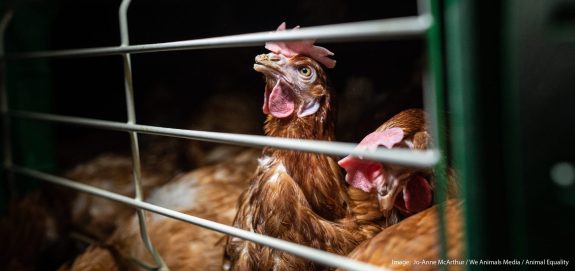Most Canadians pride themselves on being animal lovers. But despite this compassionate sentiment, Canada has some of the worst animal protection laws in the Western world—with practically no regulations or government oversight to protect animals on farms. To make matters worse, some provinces have passed troubling ag gag laws that make it illegal for undercover workers to expose animal abuse on farms.
Here are five things you need to know about ag gag laws in Canada.
1. Ag Gag Laws Are Designed To Conceal Animal Suffering
Animal farming is highly secretive, and one of the only ways for the public to learn the truth about conditions on farms is through undercover investigations conducted by animal protection organizations. There have been over a dozen high-profile undercover exposés in Canada over the past decade. Every single one has revealed shocking animal cruelty and neglect. This includes hidden-camera footage released by Animal Justice: Paragon Farms in 2020, a pig farm in Ontario, and Cedar Valley Farms in 2021, an organic dairy farm in British Columbia. Many exposés have appeared on major news channels, and have led to convictions, fines, and even jail time.
Instead of addressing widespread animal cruelty, the farm industry is trying to cover up the cruelty by pushing for ag gag laws that make it illegal for undercover whistleblowers to expose animal suffering on farms.
2. Ag Gag Laws in 4 Canadian Provinces, Federal Ag Gag Law in the Works
Since 2019, ag gag laws have been passed in Alberta, Ontario, Manitoba, and PEI.
A federal ag gag bill is current working its was through the legislative process, under the guise of trying to protect biosecurity. Ag gag Bill C-275 threatens to jail undercover farm worker whistleblowers and animal advocates who go onto farms to expose animal cruelty, and hit them with fines of up to half a million dollars.
3. Ag Gag Laws Are Likely Unconstitutional
Canada’s Charter of Right and Freedoms protects the right to free expression, and this includes the right to communicate publicly about animal abuse. Ag gag laws restrict this Charter-protected right by making it illegal to go undercover on farms to blow the whistle on cruelty and neglect.
When Ontario passed its ag gag bill, more than 40 leading constitutional and criminal law experts sounded the alarm that the bill is unconstitutional.
4. Ag Gag Laws Have Been Repeatedly Struck Down in US Courts
Ag gag laws have been struck down as unconstitutional in Idaho, Utah, Iowa, North Carolina, Wyoming, and Kansas for violating the right to free speech, which is similar to Canada’s right to freedom of expression. These US courts have recognized that free speech rights are exercised when individuals go undercover to expose animal abuse and raise awareness about the conditions in which farmed animals are kept.
5. Animal Justice Is Challenging Ontario’s Ag Gag Law in Court
Animal Justice is suing Ontario over its ag gag law, and is preparing to challenge ag gag laws in other provinces. Ontario’s ag gag law makes it an offence to obtain access to a farm or slaughterhouse under false pretences, meaning if an animal advocate or journalist obtains employment on a farm and doesn’t disclose their intentions to document and expose any animal abuse, they could be prosecuted.
Ontario’s ag gag law also restricts the right to protest on public property and document the conditions of farmed animals inside transport trucks. This appears to directly target animal advocates in the Animal Save Movement, who regularly bear witness to animals who are injured, sick, and dying in transport on their way to slaughterhouses, or are being transported in extreme weather or other poor conditions.




